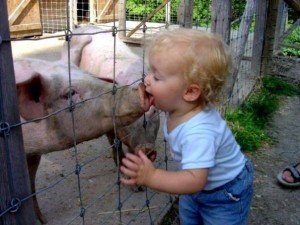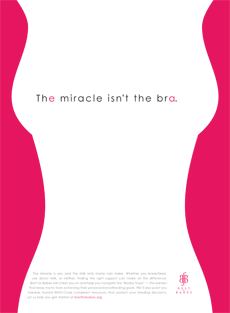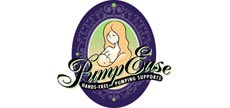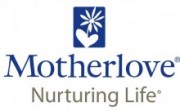The CDC issued guidelines for moms who are breastfeeding, or considering breastfeeding, and are concerned about the swine flu (H1N1 flu). The swine flu is a particularly nasty strain of flu that is spreading from person-to-person just like the regular flu. I might add that this information is helpful too, for any mom who is feeding formula but has access to screened, pasteurized donor milk from a human milk bank. I thought these guidelines were excellent, and show just how critical breastfeeding is!
Here is a summary, beyond the already widespread urging to wash hands and not cough or sneeze on anybody, including your baby. (If you are ill, or coughing and sneezing, you may want to see a doctor to be tested for the flu and consider wearing a mask.)
-
Breastfeed to protect your baby. Nursing moms make antibodies to viruses and pass these along to their babies while nursing, or through expressed milk. Antibodies help fight infection, so the best thing all mothers can do is continue breastfeeding. “Flu can be very serious in young babies. Babies who are not breastfed get sick from infections like the flu more often and more severely than babies who are breastfed.”

Not how we got the swine flu, but a cute picture!
-
Don’t stop breastfeeding if you think you have come into contact with the flu. “Because mothers make antibodies to fight diseases they come in contact with, their milk is custom-made to fight the diseases their babies are exposed to as well. This is really important in young babies when their immune system is still developing. Breastfeeding also helps the baby to develop his own ability to fight off diseases.”
-
Breastfeed even if you are sick with the swine flu, or any other flu. “Breastfeed early and often. Limit formula feeds as much as possible. This will help protect your baby from infection. If you are too sick to breastfeed, pump and have someone give the expressed milk to your baby.”
- If your baby is sick, breastfeed! “One of the best things you can do for your sick baby is keep breastfeeding. Babies who are sick need more fluids, and breast milk is better than water, juice or Pedialyte®. Breastmilk is easier to digest (some babies who have a stomach virus will throw up Pedialyte®, but not breastmilk) and is custom-made for your baby, meaning that the water content of your breastmilk adjusts to what your baby needs. Also, did you know that your breasts can detect a one degree drop in temperature in your baby and warm up to act as an incubator?
- “If your baby is too sick to breastfeed, he or she can drink your milk from a cup, bottle, syringe, or eye-dropper.” Using these types of feeding methods will ensure that your baby goes back to the breast easily. Using a nipple and a bottle may cause your baby to change his/her “latch” which can make breastfeeding difficult and/or painful.
- “If no expressed milk is available, you can give your baby milk donated by other mothers to a HMBANA-certified milk bank.”
- Continue breastfeeding even if you are taking medicine for the flu. If your doctor is unsure about whether you can continue breastfeeding, or says you should stop, refer them to the CDC guidelines or the CDC H1N1 website often for the most recent updates.
An intriguing new study, as posted on Yahoo! today, (http://news.yahoo.com/s/hsn/20081029/hl_hsn/breastfedbabymaymeanbetterbehavedchild): “Parents of youngsters who were breast-fed as infants were less likely to report that their child had a behavior problem or psychiatric illness during the first five years of life, a new study found.
And the likelihood of mental health issues decreased in proportion to the duration of breast-feeding, meaning that a child who had been breast-fed for a year was less likely to have behavior problems than a child who had been breast-fed for just two months.
”This is an early finding, but it suggests that breast-feeding during infancy could have an effect on behavior during childhood,” said the study’s lead author, Dr. Katherine Hobbs Knutson, a resident in the department of psychiatry at Massachusetts General Hospital in Boston. . . . The new study reviewed more than 100,000 interviews of parents and guardians of children between the ages of 10 months and 18 years who participated in the National Survey of Children’s Health.”
We’re not surprised by this finding, as other studies suggest that breastfed children weather stress better, for example divorce. It also makes sense when considering that breastfeeding protects the mother against post-partum depression, and that breastfeeding mothers report feeling more rested and getting an average of 45 minutes more sleep a night. (See the amazing and lesser-known facts on our home page). The fact is, that breastfeeding, especially when it is adequately supported and moms can get off to a good start, is tremendously soothing and balancing for both babes, i.e. mom and baby.
Is this a cause for guilt if you did not want to or could not breastfeed? No, but it is an opportunity to explore what the obstacles were that kept you trying or succeeding. It is an opportunity to fight the barriers that trip moms up, like insufficient maternity leave, hospitals that give ”breast is best” lip service but don’t follow through, and discrimination and disapproval everywhere a new mom turns. It is an opportunity to help other mothers so they would not have to suffer through a rocky start like I did.
And that is a behavior worth applauding.
Well, neither did I, but I sure wasn’t going to tell anyone about it. I suspect that there are many other women who feel the way I did. I didn’t admit it to anyone because I didn’t want anyone hitting me over the head with the benefits of breastfeeding, telling me how long I had to breastfeed, or otherwise guilting me or putting on the pressure.
So we wrote a piece for our friends who don’t want to breastfed, and we hope you will tell us what you think. It’s right on the home page of http://www.bestforbabes.com under “Inspire”.
Check it out and let me know!
When we tell people we are in the boob business this is what we hear:
1) What’s the big deal? Aren’t most moms breastfeeding?
No. Although 64% of new mothers try breastfeeding, only 14% make it to the minimum six months exclusive breastfeeding recommended by the American Academy of Pediatrics. Worse, most throw in the towel in the first few weeks. Compare that to Sweden’s rates of 99% initiating and 79% nursing at 6 months, respectively, no wonder the U.S. has one of the lowest rates of breastfeeding among all industrialized nations. Thousands of needless deaths, and billions in health care costs in the U.S. could be prevented by raising our national breastfeeding rate.
Especially shocking is that breastfeeding rates actually declined from 70% in 2002 to 63.6% in 2006 following the Government’s $40 million ad campaign highlighting the risks of not breastfeeding. This nearly invisible campaign was botched under powerful lobbying pressure from the formula companies-who increased their own advertising budgets from $30 million to $50 million while the ads ran. To top it off, the government buckled to pressure and held back a press release on a major meta-study underscoring the risks of not breastfeeding (see below)-information that prospective parents DESERVE to have.
2) I wasn’t breastfed and I turned out fine.
Another way of looking at this statement is to compare it to statements like “I didn’t wear a seatbelt when I was a kid and I turned out fine” or “I didn’t wear sunscreen as a kid and I don’t have skin cancer.”
For the first example, seatbelts, we all know by now that seatbelts save lives, mostly because of a brilliant ad campaign that drummed it into our heads, and statistics on crash fatalities involving seatbelts or lack thereof. Luckily for the seatbelt campaign, there were various industries that benefitted from seatbelt laws: automakers that installed them meaning new cars had to be purchased, and law enforcement that could fine if people were not wearing seatbelts! Most importantly, there were no industries that were lobbying against or advertising against wearing seatbelts, as it would be really bad public relations. Not so for breastfeeding. It gets lobbied against and combined marketing budgets total in the billions.
In the second example, skin cancer, it’s somewhat like the first; we know frying in the sun without sunscreen increases the risk of skin cancer, and effective advertising campaigns combined with industries that stand to benefit made for a great combination in educating the public.
But what if you add “yet” to the end of the sunscreen sentence? “I didn’t wear sunscreen, and I don’t have skin cancer, yet”. That’s really what we should hear when someone says “I wasn’t breastfed, and I turned out fine.” You may be fine for now. And we don’t want to scare anyone, but everybody is working really hard to sweep the risks of formula under the rug, and that is not right, or ethical. Parents deserve to know what the risks are, so they can make the best decision for themselves and their families.
So why do so many people seem “fine”? Well, for one thing, most people are not aware of the risks of not breastfeeding, so they are not thinking, I have digestive problems, or allergies, or diabetes, and it could be because I wasn’t breastfed. So when people say, “I turned out fine,” we try not to debate on an individual basis, because every person is different! Some people we know smoked like a chimney their whole lives and never got cancer, but nobody would dream of saying “smoking is fine.”
One thing people might want to consider is that times have changed. Our immune systems need all the help they can get given an increase in environmental stress, overuse of antibiotics, increase in vaccines (and the autoimmune diseases that may be related to that). While the previous generation may have turned out fine not so for this generation, that has drastically increased rates of obesity, diabetes, Crohn’s disease, allergies and autism, to name a few. Our view is that babies nowadays especially need all the help they can get, and that means breastmilk, either from the mother, or screened, pasteurized, donated human milk.
Here is an excellent summary* of the news release that was withheld under the influence of formula lobbyists:
Breastfeeding reduces babies’ risk of these diseases by:
- Sudden Infant Death Syndrome (SIDS): 36%
- Type 1 Diabetes: 19-27%
- Type 2 Diabetes: 39%
- Leukemia (acute lymphocytic) : 19%
- Leukemia (acute myelogenous): 15%
- Asthma: 27%
- Gastrointestinal infections: 64%
- Lower respiratory tract diseases: 72%
- Atopic dermatitis: 42%
- Acute otitis media: 50%
And breastfeeding reduces mothers‘ risk of these diseases by:
- Type 2 Diabetes: 4-12%
- Ovarian cancer: 21%
- Breast cancer: 28%
*(from Motherwear’s breastfeeding blog, “This information comes from a new meta-analysis (study of studies) from the U.S. Department of Health and Human Services. This study looked over 9,000 studies on breastfeeding from developed countries, weeded out the ones with poor methodology, and came up with an overall percentage for each one. This is harder than it sounds because “breastfeeding” is defined differently in each study.”)



 @BestforBabes
@BestforBabes Best For Babes
Best For Babes






